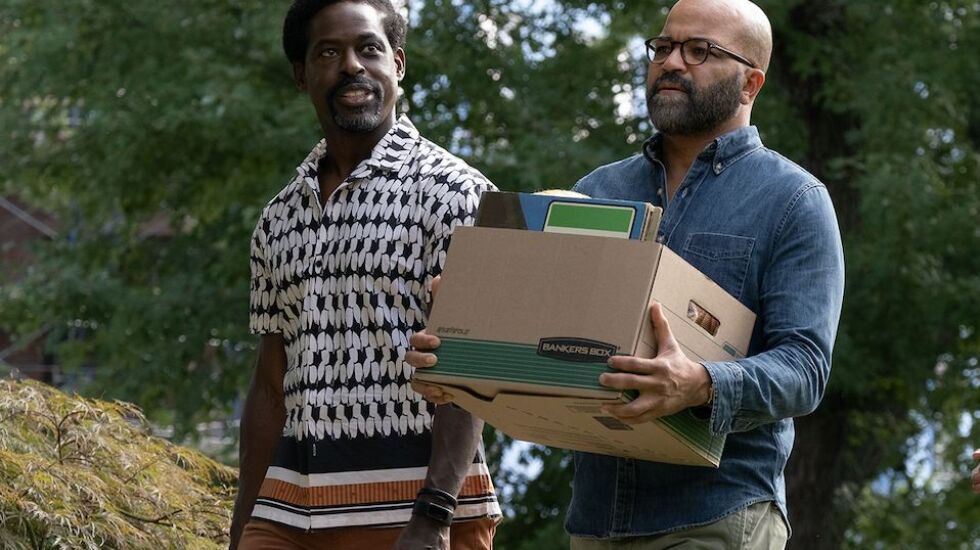
Jeffrey Wright is usually third or fourth or fifth on the call sheet, providing invaluable and memorable supporting work in films such as “Broken Flowers” (2005), “Casino Royale” (2006), “Source Code” (2011), the “Hunger Games” films and “The Batman” (2022), with the occasional starring role, e.g., “Basquiat” in 1996 and the 2016 prison drama “O.G.” In writer-director Cord Jefferson’s timely and sharp and subversively funny “American Fiction,” Wright is accorded the relatively rare opportunity to take the lead, and he delivers a richly layered performance that reminds us he’s one of the best actors of his generation. It’s a joy to watch.
I’m tempted to say Wright’s Thelonious “Monk” Ellison, a misanthropic writer and college professor, would be friends with Paul Giamatti’s crabby boarding school history teacher from “The Holdovers” if they lived on the same timeline and in the same cinematic universe, but they share so many similarities they probably wouldn’t want to be in the same room with one another. Too much like looking into the mirror.
California-based Monk hasn’t published anything in years and recently exploded at a student who was offended by a book title Monk had written on a blackboard, leading to a disciplinary hearing and a forced leave of absence. Without an excuse to avoid his family, Monk returns to his hometown of Boston, where his sister, Lisa (Tracee Ellis Ross), a doctor at a center for reproductive rights, has long been the sole caretaker for their ailing mother, Agnes (Leslie Uggams), who has early stage dementia. Monk has been out West, and hard-partying younger brother Cliff (Sterling K. Brown) has been forging a new life in Arizona after coming out and getting divorced. With Agnes having to move to an expensive extended-care facility, the siblings might have to sell the treasured family beach house in New England just to make ends meet.
Monk is living in a Woody Allen, Nancy Meyers type of world, but his agent and would-be publishers and readers want him to be more of a “street lit” guy. While Monk’s historical works are on the “African American studies” shelves in bookstores simply because the author is Black, the publishing world and audiences are embracing the Book of the Moment, “We’s Lives in Da Ghetto” by Sintara Golden (a wonderful Issa Rae), a stereotype-laden story written in an Ebonics style.
In a fit of bitter resentment, Monk hammers out a satire titled “My Pafology,” which is filled with “deadbeat dads, rappers [and] crack,” at one point imagining a cliché-riddled confrontation between an absentee, no-good dad (Keith David) and his criminal son (Okieriete Onaodowan), who occasionally pause to wait for Monk to write their next lines. Monk even invents an author for the book: one Stagg R. Leigh, a felon and fugitive who must remain in the shadows lest the authorities find him.
You can probably guess what happens next. Publishers trip over each other to offer “Stagg R. Leigh” six-figure advances. The book is rushed into publication and becomes an awards contender. A condescending hipster director (Adam Brody) wants to adapt “My Pafology” into something edgy and real. All of this only serves to horrify Monk — not that he’s going to turn down the money. Here he was, trying to make a point, and nobody, I mean NOBODY, is getting the joke and understanding they’re being insulted.
This is the feature-film debut for the talented Jefferson, whose writing credits include “Master of None,” “The Good Place” and “Watchmen.” Adapting Percival Everett’s acclaimed experimental 2001 novel “Erasure,” Jefferson has packed in myriad storylines and embraced a number of stylistic flourishes, some more effective than others.
There’s a lot going on with Monk and the people in his life. He and Lisa have a strong sibling bond, but she’s exhausted from looking after their mother, whose memory is getting worse by the minute, and she resents Monk for having moved across the country. Meanwhile, brother Cliff is snorting his way into some troublesome territory. In the midst of all that, Monk strikes up a romance with the lovely, smart, funny and warm Coraline (Erika Alexander), a lawyer who lives across the street from the family beach house and has no idea Monk is also Stagg R. Leigh. There’s even a sweet little story about Myra Lucretia Taylor’s Lorraine, who has been the family housekeeper for decades, getting her own chance for romance.
As “American Fiction” rings up the satirical points, we come to realize this is also a coming-of-age story, or should we say a coming-of-middle-age story, about a man who is reluctantly, slowly, allowing himself to care about the people in his life.







